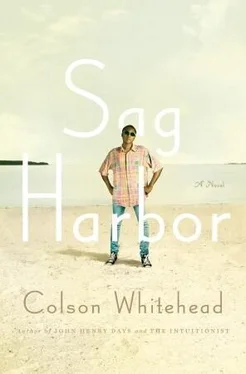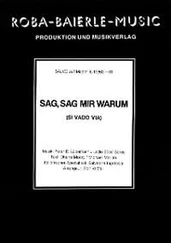AT A QUARTER TO FOUR, I headed off to work. I sniffed my shirt again: funky. Martine was going to be there to oversee the weekend delivery, and NP was on duty, so I was going to get ribbed over the Head-Patting Incident. Plus, on Thursdays people got an early start on the weekend, dribbling in with their crumpled bills and thirsty stares. It was going to be a tough shift.
The wind had picked up. Maybe it was going to rain, but not anytime soon. I could take the beach shortcut. Taking the beach meant you skipped a bunch of streets, Terry Drive and the rest, emerging on Bay Street with a nice head start. Terry Drive was named after Maude Terry, the spiritual architect of the developments, and, if one followed the long stream of cause and effect, the series of consequences rippling across the generations, responsible for every second of my Sag Harbor life. On old Maude Terry's shoulders lay the blame for all of it.
She was part of a group from Brooklyn and Queens who started coming out in the '30s and '40s, staying in the Eastville section, near the Hempstead House. Eastville was where the black and Indian workers settled during Sag Harbor's whaling boom, working the ships. One day our Maude, after walking through the dirt paths summer after summer to what would become Azurest Beach, decided to investigate who actually owned those woods. Which meant that she had already conceived of some idea of the developments, right? Why investigate unless you had a plan. What incident put the idea in her head, what kind of day or evening did she have to make her hope and scheme, think up such a thing? That was one story not handed down.
The twenty acres belonged to a man named Mr. Gale, who'd been trying to unload them for some time. No one wanted the parcel. It wasn't on the Atlantic, like the prime acreage of Bridgehampton, South Hampton, etc. Terry hatched a plan where she'd sell the lots for him — to her friends, to her friends' friends, and so on, the middle-class black folk of their acquaintance—$750 for an inside lot, $1,000 for a beachfront lot. The word went out. One by one the houses went up.
Cut to forty years later, to me, more specifically, as I made my way to work and confronted one small hitch. Taking the beach shortcut meant running a gauntlet of forced social interaction. That afternoon, I saw as I walked along the side of the house down to the bulkhead, I caught a break. There was only one of my mom's friends on the beach in front of our house. It was Mrs. Collins, Marcus's mother, a copy of People magazine in her lap. Her hand dangled over the side of her beach chair, falling on the rim of her glass of white wine. Sand clumped to the condensation on the glass like rust. There were three empty beach chairs. I saw bathing caps in the water. Good timing.
“How are you today, Mrs. Collins?”
She looked at me over the rim of her sunglasses. “Fine, fine,” she said. She inspected my dirty shirt. “You headed off to that Jonni Waffle?”
“Yes.”
“You going to bring back a little of that Rocky Road?” she asked, as she did every time she caught me on my way to work. I was such a square that I always took her literally, and my mind reeled into desperate scenarios where I was forced to smuggle out a pint under and between laser beams, past infrared sensors. Martine allowed us one take-home pint a week “for our families,” and the mothers of Jonni Waffle employees gleefully spread the word, lording over their access to Candy Apple Praline and Vanilla Nut Swirl. Mrs. Collins and I were not related. If I brought a pint home for a family friend, was I breaking Martine's trust? Did I care about Martine's trust after the Incident? Contributing to my neurotic back and forth was that we didn't carry Rocky Road, that flavor being too pedestrian for the full-tilt exotic cavalcade that was Jonni Waffle. Not only was she asking me to steal; she was asking me to steal something that didn't even exist. A thought problem: the Moron's Dilemma.
To repeat: “You going to bring back a little of that Rocky Road?”
I nodded.
“When are your parents coming out?”
“Tomorrow,” I said.
She smiled. It was a merry joke, when our parents were coming out. “Alright then,” she said.
I went on my way. Most of the houses on the beach back then were modest bungalows, fronted by decks that stabbed out toward the bay or by sloping grass lawns that slunk down to the bulkhead. The exception was the Martins', which squatted over three lots and was a real Hamptons-style modern beach house, one you might see in a magazine when they ran out of white Hamptons houses to feature. Which was never. It was the biggest house in Azurest at that time, a refugee from the other side of the island, its great windows pretending to overlook some tonier stretch of beach. Mr. Martin owned a few R&B stations in the Northeast and was pretty loaded. There were always pickup trucks parked outside belonging to the gardeners, the pool guys, the dudes performing who knew what upgrades and installations inside. I'd never been inside — everyone's parents went to the parties, but kids weren't allowed.
Everyone still talked about Mr. Martin's fiftieth birthday party, when he hired Gladys Knight and a Pip to perform. They could only afford one Pip after all the food and liquor. It was a new breed of bash. Bobby's grandfather, who was part of the first generation, used to tell us how when the houses first started going up, on the dirt roads before the developments got paved, everyone was welcome when you threw a party. Maybe you didn't know each other personally, but you all had the same story, right, when it came down to it: after a long journey you had found safety on this shore. Survivors and neighbors. Weekdays were quiet, run by the wives, who took care of the kids, hit the beach, and tended to the developments with matriarchal care. The men came out on Friday, and the socializing began. If you saw the lights or heard the music, according to Bobby's grandfather, you walked on up and pushed in the screen door, whether you knew the person or not. And once you walked in, you were blood brothers.
That sounded crazy, frankly. The custom of a better time. Half the fun of having a party, it seemed — and I speak as someone who was not invited to parties, and thus had an outsider's perspective — was in excluding people, especially your neighbors, who would be forced to listen to the music and laughter, closing their windows to keep noise out as some closed windows to keep noise in.
The houses ended at Azurest Beach proper, where you set up your blankets and gear if you weren't hanging out in front of the house of someone who lived on the beach. It was where Reggie and I and Marcus and Bobby had spent most of our sunny afternoons as children, doing the standard kid-on-a-beach stuff, making things out of sand, throwing dead crabs at one another. Our replacements were there, reenacting our botched creations, our futile pastimes. And one day they'd be passing their own replacements as they tromped off to work in town. I didn't recognize any of their mothers, but waved anyway, and they waved back. We were neighbors.
I jumped over the tiny trickle we had always referred to as the Minnow, but what anyone with any sense called the Drain Pipe, which was less romantic but more honest. It was where the street runoff trickled into the sea. Tiny silver minnows hung out there, which we used to use for bait. We dragged an old bedspread up toward the ridged pipe, scooping up dozens of fish into our dingy net. When we hoisted the cloth between us, straining against the weight of the water as it drained out, the minnows hopped and flopped on the dirty threads. We drove our hooks through them, twisting their slender bodies on the metal as their guts and eyes popped out. We dropped our lines off the Long Wharf or dry-cast off Azurest, hoping for a nibble from the porgies and baby snappers. We hadn't fished in years.
Читать дальше












